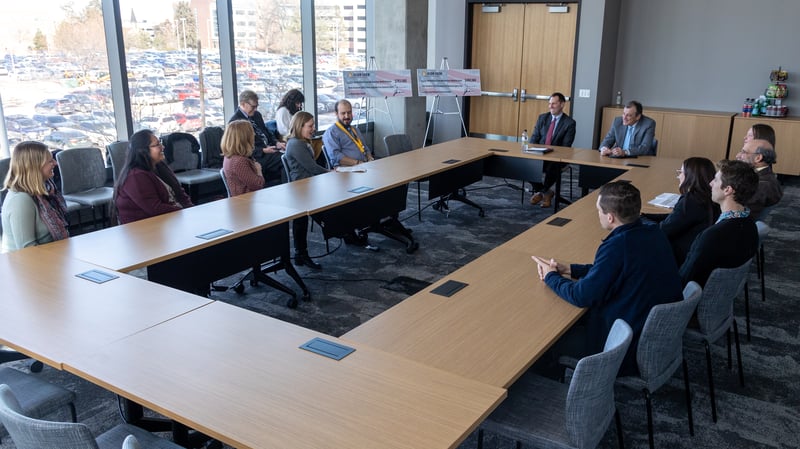U.S. Rep. Jason Crow came to the University of Colorado Anschutz Medical Campus on Friday for presentations on two initiatives that received Community Project Funding in the federal budget approved by Congress in December.
The projects that received funding provide training for students obtaining a rural public health certificate and support students from underrepresented backgrounds in pursuing education in injury and violence prevention. Both are collaborations between the CU School of Medicine and the Colorado School of Public Health.
“We see things that have amazing growth potential and that can punch way above their weight if they just get that initial seed money,” said Crow in a meeting with School of Medicine Dean John Reilly Jr., program leaders and staff, and five students participating in the programs.
“When the university came to me with these two in particular,” Crow said, “I knew right away that they had that potential not to just provide direct service to folks, but also serve as a model. That’s the other thing I look for in my grant requests, is what are things that can be pilots or models that can be scaled or replicated in other parts of the country.”
Focus on rural health
Mark Deutchman, MD, associate dean for rural health at the School of Medicine, and Danielle Brittain, PhD, associate dean for academic and student affairs at the Colorado School of Public Health, made a presentation about the rural public health certificate program.
That program, which received $783,580 to develop a curriculum that allows medical students to obtain a public health certificate during their years in medical school, helps future rural physicians prepare for larger community health needs.
“The idea is that we know that physicians that end up in rural communities have to wear a lot of hats,” Deutchman said. “I was a rural physician for 12 years in a small place, and I was on the fire department.
“One of the things we know is that rural physicians need to be aware and work on the health of the community at large,” Deutchman said. “Firearm safety is a thing we talk with our students about, but medical school has not necessarily always equipped people so that when they go to a rural community, they’re apace with all this stuff. It’s, ‘How do I address this? I know how to deal with a person with diabetes, or a person with a laceration, but how do I address a larger issue in the community?’"
Brittain has been working with Deutchman on the program.
“Together we said, 'Let’s just figure it out,' and we’re figuring it out,” Brittain said. “It’s going to be essential for these students to go into these communities with a public health background on prevention and risk-reducing service so they can understand how to take the strengths of these communities, as well as the challenges, and to work together with them to create healthier lives and help our communities.”

U.S. Rep. Jason Crow's campus visit highlights important collaborations happening
between the CU School of Medicine and the Colorado School of Public Health.
Reducing injury and violence
Ashley Brooks-Russell, PhD, MPH, associate professor at the Colorado School of Public Health and director of the Injury and Violence Prevention Center, and Emmy Betz, MD, MPH, professor of emergency medicine and deputy director of the center, discussed their efforts.
“We’re a young group,” Brooks-Russell said. “We were established just a year and a half ago, and we’re growing rapidly. This will help us grow even quicker. Our goal is to reduce injury and violence here in the sixth congressional district and in the state. Our vision is to impact the Rocky Mountain region.”
Through research, training, and education, as well as translating research into practice, the center is addressing drug overdoses, child abuse, intimate partner violence, impaired driving, suicide, and gun violence. Brooks-Russell mentioned that walking to the meeting with Crow, she had received an email about another school lockdown due to threats.
Brooks-Russell said there’s a great need for better education and prevention efforts. She leads the Healthy Kids survey for the state, and in fall 2021, a new question about how quickly a high school student could get access to a loaded firearm reported that 19% could do that in less than one hour, a finding that will soon be published in JAMA Pediatrics, with a first author who is a student.
The $460,584 in funding for the Injury and Violence Prevention Center will support students from underrepresented backgrounds in pursuing an education in injury and violence prevention through outreach programs and financial support. It will also support hiring and training faculty.
“This funding is so helpful for the larger vision and bulk of work around injury prevention,” said Betz. “It’s wonderful to have Ashley’s leadership for the center to look at the whole picture and how we use similar methods across problems.”
Collaboration to meet community needs
Students described their experiences and how they can benefit from these programs. Allison Bevel, a first-year medical student from Frederick, Colorado, said she decided to pursue medical school because she wanted to help provide care in rural communities. She described how her grandparents, who lived in Craig, Colorado, would stay in an RV in her family’s backyard while her grandfather was getting cancer treatments on the CU Anschutz campus.
Reilly noted that these programs are collaborations between schools on the CU Anschutz Medical Campus, fulfilling a major priority of the campus to promote interdisciplinary work for the improvement of health. He also noted that these programs themselves have the potential to collaborate with each other.
The funding for these programs were sponsored by Crow in the House and by U.S. Sens. Michael Bennet and John Hickenlooper in the Senate.
Reilly thanked officials for their support, adding, “As they said at the end of Casablanca, I hope this is the beginning of a beautiful friendship.”



